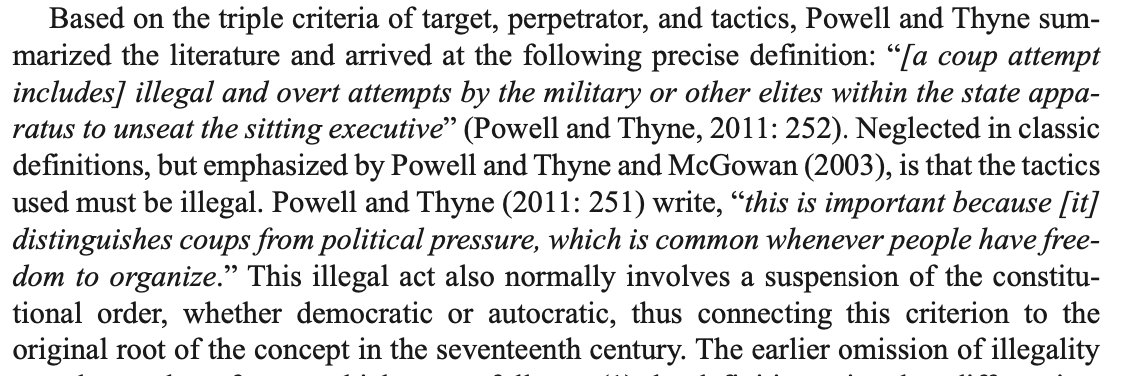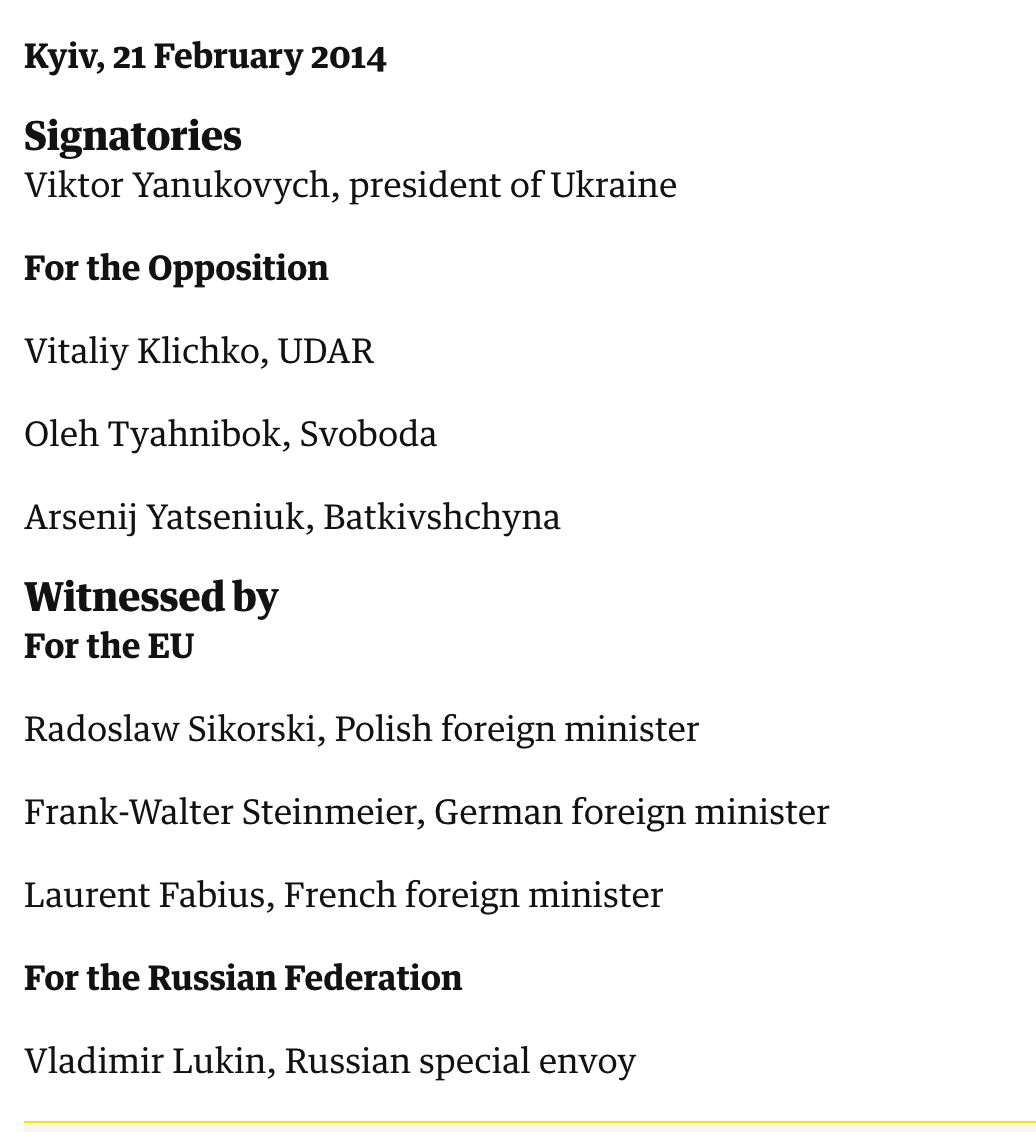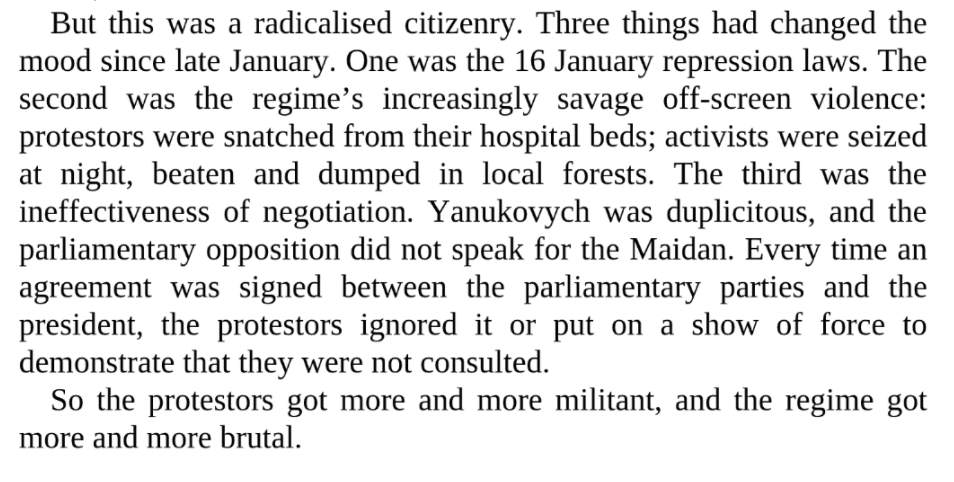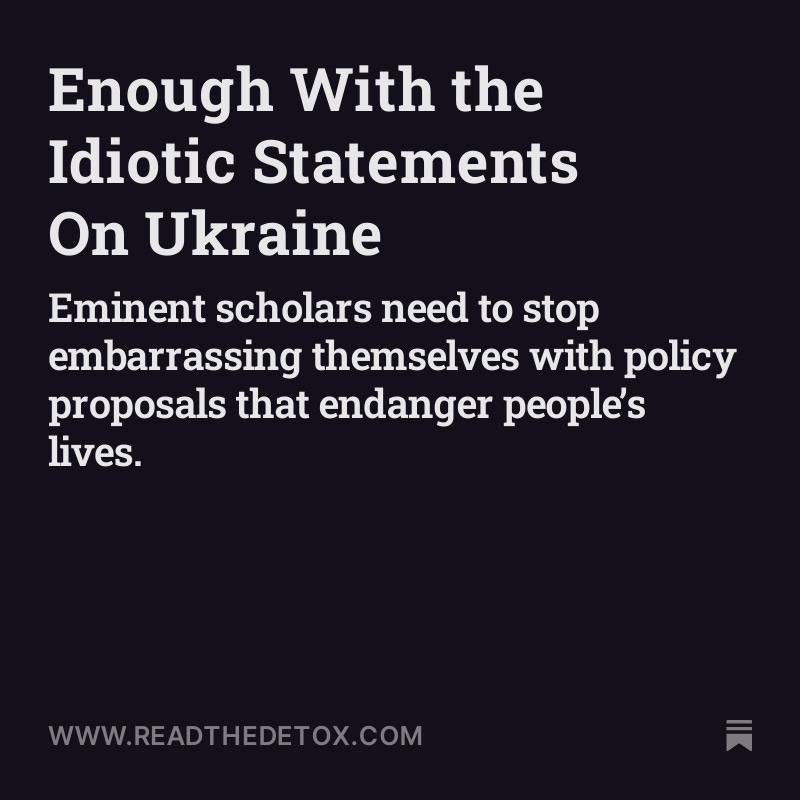According to tankies, the 2014 Euromaidan revolution, in which Ukrainians rose up and ousted kleptocratic dictator Viktor Yanukovych, was a “coup” by the U.S. acting in cahoots with Ukrainian Nazis. Was it?
Short answer: No
Long answer: Also, no.
Let’s dig in.
Short answer: No
Long answer: Also, no.
Let’s dig in.
This thread, on the Euromaidan, is the first of three debunking tankie claims about Ukraine. The next two, respectively, will address the Donbas “rebellion” of 2014-21, which was actually a covert Russian invasion, and the far-right’s influence in post-Maidan Ukraine.
The tankie narrative about the Euromaidan actually consists of three separate assertions: (1) that it was a “coup, (2) that it was engineered by the U.S., and (3) that it was carried out by the Ukrainian far-right. We will consider each in due course.
The Euromaidan revolution lasted from November 21st, 2013 to February 21st, 2014. It is the critical starting point for understanding how we got to where we are today, for a number of reasons:
Not only did the Euromaidan usher in Ukraine’s most recent experiment with democracy; it also served as a sort of second founding for an independent, post-communist Ukraine (the first having occurred in 1991 with the declaration of independence from the USSR)
The Euromaidan marked the maturation of Ukrainian civil society. It also gave rise to a new national ethos of a nation that came together to cast off a predatory dictator propped up by the Kremlin.
That nation, moreover, came to be seen by Ukrainians as defined not by ethnicity or language but by common membership in a democratic state. It might not have been entirely true at the time but it has since become increasingly so, especially after the Russian invasion of 2022.
Finally, the Euromaidan precipitated Russia’s war against Ukraine—the first war, that is, which saw Putin’s forces occupy the Crimean peninsula and soon after launch a stealth invasion of the eastern Donbas region.
By the way, don’t even think about replying to this thread with some bullshit about Oliver Stone’s ridiculous documentary about the Euromaidan.
Stone’s film resembles an extended Twitter thread by the New York Times Pitchbot: “We wanted to understand what really happened during the Euromaidan so we sat down with Vladimir Putin and Viktor Yanukovych at a Fuddruckers in Tampa.” I’m not shitting you; that’s what it is.
“In this Donetsk pub, it was a tradition: Team up with a bunch of mafia oligarchs, win power, install yourself as dictator, and loot the country. But now the woke mob has taken it all away.”
—Oliver Stone, probably. (Sorry, I’ll stop.)
—Oliver Stone, probably. (Sorry, I’ll stop.)
Anyway, let’s begin with the easy part: Debunking the tankie refrain that the Euromaidan was a “coup.” When you think of a “coup,” you probably imagine the military or some other state faction unlawfully ousting the government, right?
If so, that’s good, because it’s exactly how political scientists conceive of it as well: As one prominent definition holds, coups refer to “illegal and overt attempts by the military or other elites within the state apparatus to unseat the sitting executive.” 

Here's the link to that article: journals.sagepub.com/doi/pdf/10.117…
So, going by both the popular conception as well as the way experts define it, a coup, by definition, is carried out by *state actors*. 

If, instead, the government is overthrown by thousands of people in the streets or even by some non-state organization such a political party, that’s not a coup, and it would be misleading to call it so. A coup is executed by state actors; otherwise it’s not a coup. Period.
According to our best estimates, a full 20% of the population, or over 8 million people, took part in the Euromaidan. That, dear reader, is not a coup. Even if you choose to believe that it was a nefarious scheme by far-right organization Right-Sector, it still wasn’t a coup. 

(Link to that poll; use Google Chrome to translate it) dif.org.ua/article/richni…
Now onto the second of the three claims—that the Euromaidan was engineered by the U.S. government. When making this argument, there are a few bits of “evidence” the tankies like pull out of their ass.
First, they’ll note how prominent U.S. politicians like John McCain and Victoria Nuland came to Kyiv to express solidarity with the protesters and, in Nuland’s case, went so far as to…hand out complementary baked goods.
Short of distributing millions of meth-laced cookies, there’s absolutely nothing McCain or Nuland could have done to *make* 8.5 million Ukrainians storm the streets and oust a president.
Somewhat less preposterously, the tankies also point to the leaked transcript of a conversation between Nuland, then Assistant U.S. Secretary of State, and Geoffrey Pyatt, the U.S. Ambassador to Ukraine. bbc.com/news/world-eur…
During the call, which occurred sometime in Jan. or early Feb. 2014, Nuland and Pyatt discuss different candidates who might head a post-Euromaidan government. This, for the tankies, is the smoking-gun which proves the U.S. was responsible for driving Yanukovych from power. 



Except there’s one tiny problem with the “Victoria-Nuland-as evil-mastermind” claim. Like many countries, Ukraine has both a president and prime minister. Nuland was not talking about replacing Yanukovych as president; she was referring to who would become prime minister.
How do we know this? Well, for one thing, on Feb. 21st, 2014, the U.S. and E.U. managed to broker a deal between Yanukovych and the opposition in which Yanukovych would continue as president until new elections were held in December, a full ten months from that point. 



The full text of the agreement can be found here: en.wikipedia.org/wiki/Agreement….
The deal never came into effect. Why? Because immediately after signing, Yanukovych hightailed out of Kyiv. Within days, he’d be in Russia. Lest it needs stating, you cannot carry out your duties as Ukrainian president from the reassuring safety of Vladimir Putin’s bosom.
In sum, the Euromaidan wasn’t a coup. Nor was it the product of some malicious scheme by Victoria Nuland to replace Yanukovych.
One country, above all, did try to shape the Euromaidan’s outcome. That country was Russia. In fact, Putin’s extraordinary efforts to keep Yanukovych in power merely marked the latest chapter in the sordid history of Kremlin interference in Ukraine’s post-Soviet affairs.
Documents recovered from Yanukovych’s estate revealed dozens of phone calls at key moments between him and Putin as well as the two countries’ interior ministers. Putin et al. probably weren’t advising their Ukrainian allies to go easy on the protesters. khpg.org/en/1608809760 



Also, a recovered diary belonging to Yanukovych’s security chief documents a secret Jan. 8th meeting between Yanukovych and Putin at which they allegedly decided on a policy of unrestrained repression along with new laws to authorize said repression. euromaidanpress.com/2014/03/12/yan…
In addition, some very well-known and prominent clients of Putin, notorious for advancing the Kremlin’s interests in Ukraine, were deeply involved in orchestrating the violent crackdown of 11/30/13, which was perhaps the pivotal moment of the whole saga. ukrainianweek.com/Politics/97451 

So much for the claim that the Euromaidan was a U.S.-backed coup. But what about the role of the far-right? Is it accurate to say that the protests were dominated, driven, or merely instigated by “Nazis?”
Most experts don’t think so. But a handful, most notably Volodymyr Ishchenko and Serhiy Kudelia, argue that the far-right’s role in the Euromaidan was more significant than is often assumed. We need to take these arguments seriously.
One notion we can dispense with, however, is that the far-right made up a majority of the protesters. No expert believes that. According to Vyacheslav Likhachev, a specialist on the Ukrainian right, such people made up a mere 1% of all protesters. web.archive.org/web/2014041221… 

What Ishchenko and Kudelia contend is that the far-right’s impact was disproportionate to its size and decisive in driving the protests’ evolution and outcome.
Ishchenko finds that far-right party Svoboda was the most active participant in the protests, at least according to the frequency of its mentions in press reports. researchgate.net/publication/29…
But even going by Ishchenko’s figures, the combined participation of Svoboda and Right Sector, the other main far-right actor, still accounted for only 27% of total participation in all demonstrations. Again, the Euromaidan protesters were overwhelmingly moderate in orientation. 

Ishchenko finds the far-right comprised 20% of events marked by violence and/or confrontations with police and 29% of specifically violent events. As the arithmetically-inclined will note, this means the far-right *didn’t* account for 80% and 71% of protests in each category. 

Not only was the far-right a minority participant in confrontational and violent protests, but such protest events themselves constituted a small fraction of all protest events (20% for confrontational events, 9% for violent events). 

Kudelia likewise finds the far-right played a disproportionate role in the violence. He also concludes that, even though violence was present in only a small portion of protest events, it proved decisive in compelling Yanukovych and his allies to give up power.
Here's the link to Kudelia's article: academia.edu/36926443/When_…
The combination of a small, violent, far-right vanguard and a larger population of nonviolent protesters, Kudelia argues, freed the latter to maintain high levels of mobilization and boosted its leverage over the regime, ultimately convincing Yanukovych and his allies to flee. 

But even Kudelia lays ultimate blame on the regime. It was the regime’s recalcitrance, combined with its brutal response to peaceful protests, that instigated the turn to violence and legitimized it in the eyes of the much larger contingent of moderate, peaceful protesters. 

To see why the regime was primarily responsible both for elevating the far-right’s role in the protests as well as causing the violence, we need to examine how the Euromaidan evolved from its beginnings on 11/21/13 to its culmination on 2/21/14.
The impetus for the initial protests was Yanukovych’s decision to abandon negotiations on a trade deal with the E.U. in favor of a deal with Russia. When the news broke, about 1500 people showed up to protest on Kyiv’s Maidan square. These demonstrations were peaceful.
At one point over the next few days the protests would balloon to about 100,000 people. But by the end of November they had died down to a few thousand stalwarts remaining on the square. Had Yanukovych simply done nothing from that point, he likely could have retained power.
But, thug that he is, Yanukovych couldn’t bring himself to leave things alone. So on the night of 11/30/13, his Berkut riot police stormed the square and savagely beat the protesters. pravda.com.ua/rus/articles/2…
Popular revulsion at the regime’s violence on 11/30 would prove to be a critical turning point. Before 11/30, the protesters’ demands were mostly limited to signing the E.U. trade agreement. After 11/30, they’d escalate to include Yanukovych’s removal from office.
Not only that, but the protests became much, much bigger and expanded across the entire country. The next day, on 12/1, a half-million protesters showed up in central Kyiv. But even these demonstrations were mostly peaceful.
A 12/7 poll revealed the protests’ moderate character—only 14-15% supported seizing buildings or creating armed groups. The same poll showed anger over the 11/30 crackdown to be the biggest reason for taking part, with 70% saying so. dif.org.ua/article/maydan… 





So the impetus for the Euromaidan’s expansion as well as its radicalization came not from the demonstrators themselves and certainly not from “Nazis.” Instead, the blame rests squarely on Yanukovych’s shoulders.
But even the protests sparked by the 11/30 crackdown had died down by early January. Aside from one event on Jan. 12th numbering 10-50,000 people, the Maidan was a fairly tame affair at this point. But Yanukovych, being Yanukovych, just had to make things worse for himself.
You see, aside from being a thug, Yanukovych isn’t particularly smart. This is a guy known for boasting to foreign leaders about all the money he’d stolen—because, like, Angela Merkel totally gets it, right?
Had Yanukovych simply NOT DONE ANYTHING, the protests probably would have fizzled out. It was winter in Ukraine, and winter in Ukraine is cold. But Yanukovych is not that kind of guy. So, in mid-January he decided, for no particular reason, to up the ante once again.
On Jan. 16th, Yanukovych personally appeared in parliament to berate and threaten deputies to pass the so-called “dictatorship laws,” which essentially legalized the intensified repression his regime was about to unleash.
In merely one of many examples that make a mockery of tankie handwringing over the legality of Yanukovych’s eventual ouster, the dictatorship laws passed in a farcical session which featured a “hand-count” lasting all of five seconds.
The dictatorship laws not only revived the protest movement but radicalized it further, ushering in its most violent phase. On 1/19, 200,000 protesters flooded central Kyiv, many throwing Molotov cocktails and, after police killed two protesters, seizing government buildings.
It was this last stage of the Euromaidan that would witness the preponderance of the violence, with the far-right Right Sector assuming a prominent role. But, again, even Kudelia acknowledges that it was the regime’s recalcitrance and repression that initiated this dynamic. 

During these final weeks of the Euromaidan, Yanukovych unleashed the “titushki,” or street thugs financed with his looted money and coordinated by his interior minister. dw.com/en/titushki-th…
The European Court of Human Rights found that the titushki, together with Berkut forces, engaged in the kidnapping, torture, and murder of Euromaidan protesters. This violence by the regime was planned, not provoked. khpg.org/en/1608808762
In the video below, you can see titushki collecting blunt-force weapons along with shields from inside an administration building in Dnipropetrovsk
In addition, eyewitness accounts from the final, climactic days of violence (18-20 February 2014) offer evidence of the titushki shooting protesters with live ammunition. observers.france24.com/en/20140219-ki…
The post-1/19 phase of the Euromaidan was marked by a vicious cycle of regime repression triggering protester violence and vice versa, ending in the so-called sniper’s massacre of Feb. 20th, when government forces indiscriminately shot protesters from windows and rooftops.
The sniper’s massacre was the culminating event of the Euromaidan, resulting in dozens of deaths. The next day, on 2/21, Yanukovych would flee the capital.
Still, you can’t have an atrocity by pro-Russian forces without a corresponding false-flag theory absolving those same forces of guilt, and the snipers massacre is no exception.
There are two sources the tankies invoke to make this false-flag claim. The first is the leaked transcript of a call between E.U. foreign affairs minister Catherine Ashton and Estonian foreign minister Urmas Paet.
In it, Paet reports overhearing an emergency physician who had tended to injured protesters claiming the snipers were member of the opposition, not the regime. But the doctor denies having said that and can’t understand how Paets came away with that view. thedailybeast.com/exclusive-phot… 

The other source for the theory is Ivan Katchanovski, a political scientist who has controversially argued that the snipers’ massacre was a false-flag op by members of Right Sector, who allegedly shot the protesters to pin the blame on Yanukovych.
Katchanovski’s thesis requires a thread of its own, which I don’t have time for here. Suffice it to say, I don’t find it convincing. Along with most everyone else who studies Ukrainian politics, I believe the sniper’s massacre was perpetrated by the regime.
In brief, much of Katchanovski’s argument assumes that government and anti-government forces separately controlled a number of very, very large buildings and even entire sections of the city on 2/20. This assumption, in my view, is not plausible.
An equally large portion of Katchanovski’s thesis is based on his own amateur ballistics analyses which, being a political scientist, he’s not in any way qualified to perform.
But some of the other evidence he offers is (seemingly) more credible and, as such, requires a more extensive discussion. But it will have to wait for a future thread.
Still, even if Katchanovski is right, it doesn’t explain Yanukovych’s demise. It would be one thing if the sniper’s massacre triggered huge protests that forced him from power. But that didn’t happen. No, Yanukovych just up and left.
Again, Yanukovych wasn’t actually overthrown. Coward that he is, he fled—despite being holed up at his heavily-fortified estate, built with looted state funds, miles outside of town where he was in no particular danger. Historians Andrew Wilson and David Marples explain: 



The day after Yanukovych skipped town, parliament voted to remove him. Yes, they cut some corners, with only 73% approving instead of the required 75%. But what were they supposed to do? THE GUY HAD FLED. HE WAS ON HIS WAY TO RUSSIA.
One final note: To discredit the Euromaidan, tankies often call attention to the fact that the protests never quite enjoyed majority popular support. But that misses the point: Thanks to his autocratic conduct, Yanukovych lost his claim to legitimacy. What do I mean by that?
Legitimacy depends not on popularity but adherence to the rules. It’s about process, not outcome. Even before the Euromaidan, Yanukovych had broken these rules with abandon. His violent response to the protests merely compounded that loss of legitimacy. Here’s Andrew Wilson: 

When leaders violate the agreed-upon rules governing access to power, they sacrifice any claim to legitimacy, whether moral or practical. With his unlawful power-grabs, violent repression, and epic corruption, Yanukovych made his own bed. He’d eventually have to lie in it.
So there you have it. Whatever the tankies might want you to believe, the Euromaidan was not a coup. Nor was it engineered by the U.S. Nor was it dominated by the far-right. It was a popular revolution brought about by Yanukovych’s self-inflicted loss of legitimacy.
Stay tuned for more threads debunking additional tankie claims, most notably about the 2014-21 Russian invasion masquerading as a rebellion along with the far-right’s much-exaggerated influence over post-Maidan Ukraine. /fin
• • •
Missing some Tweet in this thread? You can try to
force a refresh



















